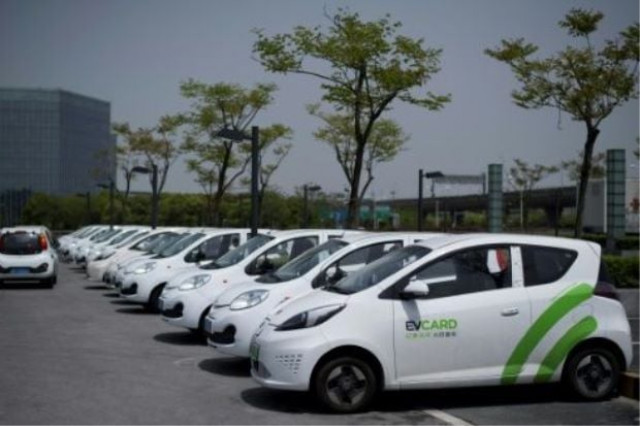Automakers see promise in China car-sharing
Car-sharing is attracting Chinese millennials who demand mobility but shun the burden of auto ownership

Car-sharing is attracting Chinese millennials who demand mobility but shun the burden of auto ownership. PHOTO: AFP
Essentially an Internet Age twist on car rentals, car-sharing is attracting Chinese millennials who increasingly demand mobility but shun the burden of auto ownership.
Long, 20, drives himself to school for around 50 yuan ($7) using EVCARD, a service launched by state-owned automaker SAIC Motor that has compact electric vehicles sprinkled around the city, slashing his travel time and costing one-quarter the taxi fare.
"It is cheaper and more convenient and very flexible. I'll choose EVCARD as my primary mode of transport almost every time," said Long.
After years of skyrocketing China sales, the global auto industry is contemplating slower growth as it convenes this week for the Shanghai Auto Show, putting alternative sales channels like car-sharing in focus.
Long-established in Western countries, such services only began appearing in China in the past two years, but are part of an ongoing Chinese personal-mobility revolution.
Already bike-sharing businesses have exploded across China, flooding major cities with bicycles that are unlocked by GPS using an app, can be left anywhere and have become critical to countless commutes.
The car that comes with a ‘share’ button
Similarly, drivers typically use a smartphone app to find and unlock shared cars, later parking them anywhere or at set locations.
Dozens of Chinese and foreign companies have now either launched or invested in car-sharing operations, with some making purpose-built cars.
Germany-based consultancy Roland Berger forecasts annual market growth of at least 45 per cent.
"That is a significant growth opportunity (for manufacturers). There are only a few hundred thousand cars now, but it's growing and it's growing very quickly," said Johan Karlberg, a Shanghai-based partner with Roland Berger.
German giant Daimler launched a car-sharing service last year that has since expanded to seven cities, gaining more than 250,000 registered users, the company said.
Jochem Heizmann, China CEO for Volkswagen, the country's top car brand, told reporters in Shanghai VW would partner with Chinese car-sharing operator Shouqi in multiple cities, partly to boost electric-vehicle sales.
"You have to see the development of such fleets as sales channels," he stressed.
Lynk & Co -- a new unit of Chinese automaker Geely, which owns Volvo -- unveiled in Shanghai two SUVs with built-in touch-screen sharing software developed with Microsoft and Sweden's Ericsson.
"Communities", such as companies or residential developments, can jointly purchase vehicles to share, or owners can share their car for a fee with other drivers who join Lynk & Co's network, said Alain Visser, the company's senior vice president.
Man 'loses' car for making 'easy money'
"It becomes an interesting concept because sharing can reduce the cost of ownership," he told AFP.
Lynk & Co also is partnering with TripAdvisor and Tujia -- China's Airbnb -- on a proposed system combining shared accommodation and cars.
"Instead of entering the (car-sharing) market once it becomes big, we want to make it big," Visser said.
Bill Russo, head of Shanghai-based consultancy Gao Feng, said such services will guide auto manufacturing in future.
"You may build them to entertain people in the backseat, or to provide more connectivity so people can be productive. We'll see this segment influence specifications," he said.
China's central government and many local authorities are keen to reduce congestion and air pollution and have dangled various incentives for car-sharing, such as eased licensing requirements and guaranteed parking.
Further supporting car-sharing's potential, countless Chinese face significant car-ownership hurdles, including cost, scarce parking and limits on car use in several major cities.
By 2020, China will have just 195 million cars for 355 million licensed drivers, Roland Berger estimates.
"Many middle-class families that can afford a second car are opting not to. It's a real hassle," said Karlberg.
High start-up costs and other hurdles in the fledgling car-share industry mean no one is making money yet, analysts say.


















COMMENTS
Comments are moderated and generally will be posted if they are on-topic and not abusive.
For more information, please see our Comments FAQ